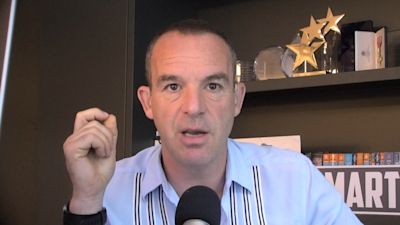Martin Lewis on the six things you need to know to limit rising energy bills

In full: Watch Martin Lewis answer viewers' questions on energy bills
Money Saving Expert Martin Lewis has revealed two strategies consumers can adopt to limit the how high their energy bills will rise in the coming months, amid the soaring cost of gas which has put dozens of providers at risk.
But the financial journalist, answering viewers' questions on ITV's Good Morning Britain, cautioned there is little anyone can do to cut the cost of their bills, warning "there is no way around" rising prices.
The rise in gas prices has been blamed on a number of factors, including a cold winter which left stocks depleted, high demand for liquefied natural gas from Asia and a reduction in supplies from Russia.
The government has promised there will be no power cuts, the price cap on energy bills will not lift, and customers will be transferred to a new provider should theirs go bust.
Despite this, thousands are worried, especially with winter on its way.
Here's Mr Lewis's advice to help people weather the storm:
Will I lose credit earned with my energy provider if I switch, or it goes bust?
Anyone switching energy provider with credit remaining on their account it should be given back by their previous provider, Mr Lewis said, "that's a standard process".
However, the situation could be a lot more difficult if someone is forced onto a new provider because of their previous provider's collapse.
"In that case it should be covered by the Ofgem safety net - your credit should be protected, even if you move - but it will likely be a hassle to get it back," Mr Lewis said.
Despite a "pain in the backside" in getting credit back, Mr Lewis said "it will happen eventually but I wouldn't expect it to be quick".
Why do energy providers require money up front to join?
Mr Lewis says it is "pretty standard process" for providers to request new customers pay their first month's bill up front.
He said it's been the case "for quite a while" but acknowledged it may seem new to some people because this could be the first time in years that they've swapped provider.
My energy provider says I need a smart meter if I go onto a fixed term tariff - why?
Mr Lewis says providers "cannot force" someone to go onto a smart meter but they can have moving to a smart meter as a condition of a new tariff.
He said letters urging people to do so may be worded in a way that seems there is no choice. This is not the case, but Mr Lewis points out it will not cost anyone any more money if they do get a smart meter.
"They're free. It's not going to cost you money and it helps you monitor your energy usage, which is a good thing," he said.
I've been offered a renewed contract at £700 extra - what should I do?
People should check if they're being offered a deal under the price cap "or a special tariff that's more expensive than the price cap", Mr Lewis said.
He said his advice to someone about to enter a new contract would be to find one on a price cap, "because it's protective", meaning bills should not go above that for the next six months.
Explaining the price cap, he said it's subject to a "time-lag", meaning it is based on wholesale prices from the six months up to the end of July, which is why it is protecting people from soaring prices "right now".
He said the next price cap "will be based on today's prices" so it will be much higher than it needs to be when it's introduced in April next year.
I am not on any fixed energy deal - should I wait til prices fall before I get one?
Mr Lewis says there are two strategies people in this situation can adopt but warns, "without a crystal ball, no one - me included - knows what the result will be".
Option one is "go onto the price cap - that gives you effectively a six month fix" because it will not go above that until April next year.
Mr Lewis says in the meantime he hopes prices will go down - although he was unable to guarantee they will.
The alternative is to "lock it on a fix for a year, that gives you protection for longer, even if you have to pay a little bit more - you could always get out of it by paying exit fees if you had to".
"That gives you security for a longer period but you pay more in the short run," Mr Lewis said.
He added: "Both the solutions I'm talking about are not about lowering the bills that you're paying now. You are going to pay pay more. You are possibly going to pay hundreds of pounds more.
"I'm talking about damage limitation to stop them rising further, I am not talking about cutting your bills."
Is there any help available for those who are really struggling?
Mr Lewis said some energy providers have "funds and budgets and help for those who are really struggling financially".
"The problem is the combined knock-on effect of all the other support measures ending", Mr Lewis said, such as the uplift in Universal Credit ending.
He said there is the Warm Home Discount, which is meant to help vulnerable people, which gives people £140 to help with energy bills in winter.
But he questioned why the government has not increased it for the past nine years, despite rising energy bills.